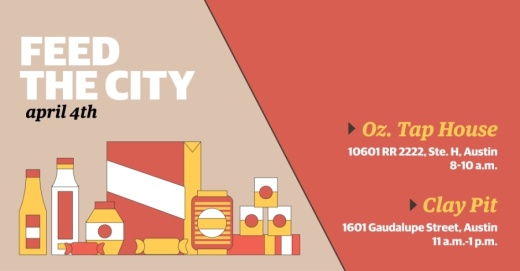Central Texas food banks are experiencing a dramatic increase in need as communities face myriad challenges brought on by the COVID-19 pandemic.
As businesses struggle and individuals seek unemployment benefits, local food banks will require the support of individuals and organizations to aid the 46 million Americans living under the shadow of food insecurity, according to Nick Marino, a director at Tango Tab.
The Dallas-based company Tango Tab has fed over 3.7 million people since 2011 by providing meals to local food charities every time a customer dines out using the application.
The company launched its monthly engagement event, Feed the City, in 2015 in an effort to bring volunteers from all walks of life together to prepare meals for the community.
On average the event can produce between 1,000 and 7,000 meals made by volunteers in about an hour, Marino said.
Feed the City has been hosted at the downtown Austin restaurant Clay Pit since 2016 and was slated to launch in the Lake Travis-Westlake area prior to the mandated shelter-in-place order issued by Travis County.
While the event is still scheduled to take place at Oz. Tap House on April 4, it will take on a different form, putting community engagement aside for the sake of safe social distancing.
Individuals are encouraged to bring granola bars, oatmeal, soup, water, peanut butter, canned vegetables and various other nonperishables to Oz. Tap House from 8 a.m. to 10 a.m.
Marino added all of these meals will be distributed throughout the community, keeping the donations local.
Feed the City workers will be sporting gloves and masks as they remove the food items from participants’ trunks or truck beds, limiting social interaction.
Despite the challenges due to the coronavirus, it was critical to move forward with the event, Marino said.
“The need is definitely increasing,” Marino said. “If you look at the capital-area food banks, they’re usually reliant on donations.”
In times of economic uncertainty, nonprofits generally experience a decline in donations, Marino explained, adding organizations saw this occur during the 2008 recession.
However, food focused nonprofits are feeling the impact of a newfound challenge. Amid news of a shelter-in-place many took to local grocery stores, leaving shelves emptier than usual.
A number of food banks, including the Central Texas Food Bank, receive food from stores such as H-E-B and other large chains that routinely donate their extra items.
“You’re not going to see that because our stores can’t even keep their shelves full,” Marino said.
Derrick Chubbs, the CEO of the Central Texas Food Bank, said he agrees with Marino, stating obtaining food items has proven to be a challenge at this time.
“You’ve seen the shelves,” Chubbs said.
Due to a lack of available goods, the nonprofit has been purchasing items at the market rate, which is more expensive.
Amid the apparent uncertainty of the COVID-19 pandemic, the Austin community can support its neighbors feeling the strain of food insecurity. Oz. Tap House and Clay Pit will both be collecting drop-off donations April 4.
“Our food organizations are going to be greatly impacted,” Marino said. “So as much as we can help as a community and get those shelves full for people in need ... it’s huge.”





